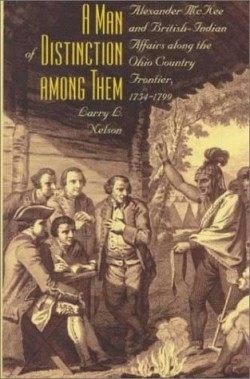A Man of Distinction among Them
Alexander McKee and British-Indian Affairs along the Ohio Country Frontier 1754-1799
The University Press syndrome of “publish or perish” quite frequently dooms author/professors to an early grave, or should. Nelson deserves to write another day. Dr. Nelson is an assistant professor of History at Firelands College with an extensive background writing about Colonial America. His style is not entirely academic and very readable. In an atmosphere of “tomahawk chops” and considerable rancor about using Native American names for sports teams, one finds it refreshing to find an honest and positive portrayal of the first American citizens. This book reveals the extent and nature of Indian men of diplomacy and their negotiating skills.
American historians for several reasons overlooked Alexander McKee, the principle of this book. First he was a Tory, a British sympathizer. Second, his association with bad company, Simon Girty, a treacherous border ruffian, tainted their perception of him. Third, McKee’s mixed race origins excluded him from correct cultural society. Names for this class of people were always pejorative. Finally, as a cultural liaison between two converging and conflicting societies, he was considered alien to both cultures by western historians.
McKee was a “cultural mediator” who translated the British policies for Ohio country Native Americans. He was one of a half dozen men that shaped British Indian relations from the time of the French and Indian wars of the 1760s until the battle of Fallen Timbers when Anthony Wayne defeated the Indian Nation. He used family ties (Delaware Indian mother and his wife, a relative of Shawnee chief Blue Jacket), extensive Native American contacts and skilled diplomacy to keep the Ohio Nations marshaled to the defense of British interests.
The American Revolution demanded a pragmatic decision of McKee. McKee had acquired considerable wealth and land in the Ohio territory, entirely British territory until this time. The new American Indian policy now demanded more and more of the land that he had used his considerable skills to keep for his adopted people. The brewing conflict between the native Americans and the voracious American land appetite made him choose the British side. McKee’s policies seemed in the best interests of the Indians, but sowed the seeds of destruction. “These skills allowed McKee and other British authorities to create a policy that successfully defended native political autonomy for nearly two generations and that, in 1791 came remarkably close to total victory. But it was also a policy that ended in total failure and led ultimately to the subjugation and eventual ruin of the region’s native people.” The battle of Fallen Timbers (1796) dealt a deathblow to organized Indian resistance. McKee died in 1799, the same year as George Washington. He was wealthy and fully integrated into British aristocracy. He was also honored in death by a large delegation of Native Americans.
The material in this book should be integrated with secondary American history in all classrooms. It is necessary reading for all serious students of American history.
Reviewed by
Harry Willems
Disclosure: This article is not an endorsement, but a review. The publisher of this book provided free copies of the book to have their book reviewed by a professional reviewer. No fee was paid by the publisher for this review. Foreword Reviews only recommends books that we love. Foreword Magazine, Inc. is disclosing this in accordance with the Federal Trade Commission’s 16 CFR, Part 255.

